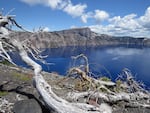
the city of Chiloquin has agreed to sell an estimated 2.5 million gallons of water to Crater Lake National Park during the months of May and June.
Holly Owens / Herald and News
Advocates are worried that Trump administration policy changes will damage the ability of national parks to deal with climate change.
Studies show climate change could have serious impacts on national parks in the Northwest.
Over time, it could melt glaciers and snowpack in Olympic National Park and the North Cascades, reduce alpine habitat and increase landslides at Mount Rainier and degrade water quality in Crater Lake.
Last year, the Obama administration issued an order to modernize the park service. It encouraged forward-looking policies that address issues like climate change.
"They recommended things like starting to think on a landscape scale — not just caring about things inside the park boundaries," said Mark Wentzler, vice president of conservation programs with the National Parks Conservation Association.
He called the Trump administration's recent decision to rescind the order "a blunt, unthinking approach" that could leave parks unprepared for problems like increased flooding and wildfire.
“If you’re a manager of Mount Rainier and you’re not looking at these things, you’re going to be blindsided," Wentzler said. "You’re going to potentially lose critical park resources because it’s going to be too late by the time you see they’re damaged.”
The Interior Department didn’t respond to a request for comment Friday.
Rob Smith, Northwest director for the National Parks Conservation Association, said he hopes the Trump administration will issue a new order to replace the one it rescinded.
"National parks don't have nearly enough money right now to do what they’re asked to do," he said. "So, it’s always a challenge for a park director to decide what’s the most important thing: What does the president want me to do?"
Having some guidance from the administration will help park managers prioritize, according to Smith.
For example, he said, it could help managers at Crater Lake National Park continue to fund research into the effects of climate change in the lake, where warmer water temperatures are changing currents and could lead to algae blooms and reduced water clarity.
"I still trust the park service will protect our parks," he said. "But in the long term, it really depends on the budgets the administration gives it and guidance."
